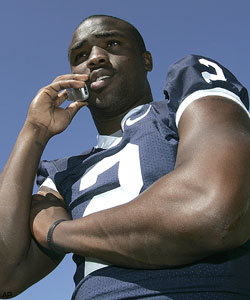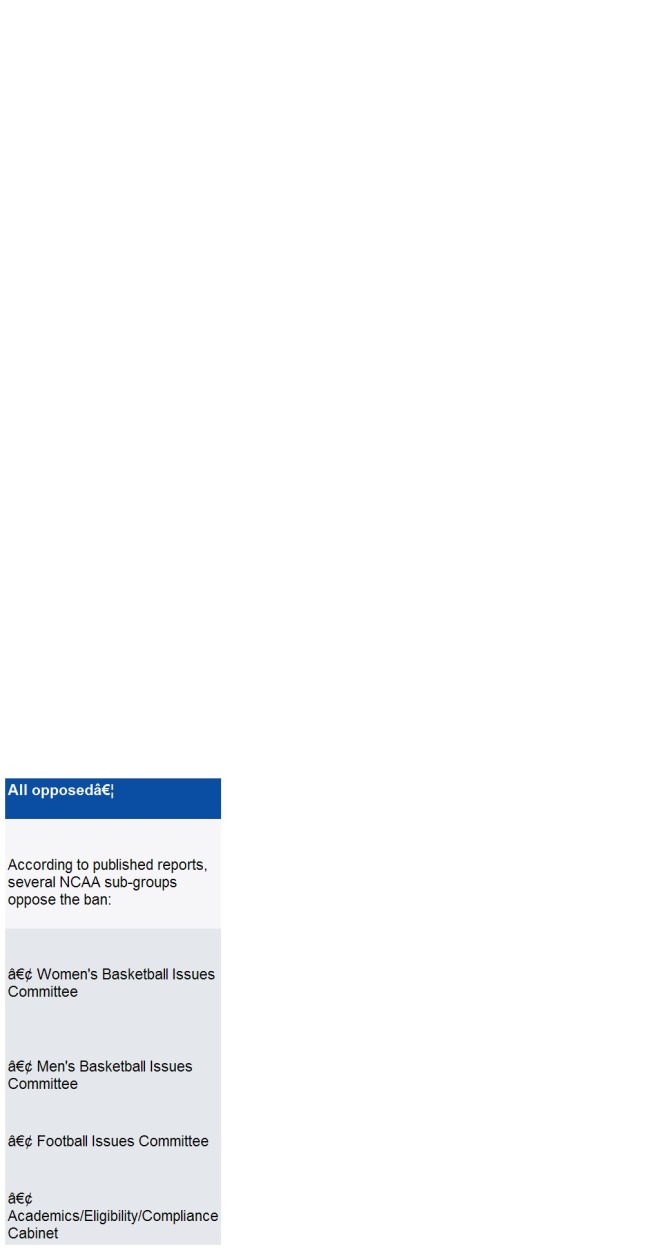NCAA set to ban recruit text messaging


Text messaging is as much a part of recruiting as are official visits.
Advertisement
However, it looks like text messages are about to become a thing of the past when it comes to recruiting.
The NCAA's Division I Management Council voted on Tuesday to eliminate the use of text messaging in college recruiting. The committee opted for an outright ban, which was first proposed by the Ivy League, over another proposal that would merely limit text and instant messaging to certain days of the week and particular hours. If approved by school presidents and chancellors on the Division I Board of Directors next week, the measure will take effect Aug. 1.
Today's college recruiters rely on BlackBerrys, Sidekicks, Treos, e-mails and instant messages to keep up with prospects. But Division I Student-Athlete Advisory Council chairwoman Anna Chappell said these forms of communication have become too costly, too intrusive in a prospect's life and the line between coach and prospect has become blurred.
"It's intruding on their lives and creating inappropriate relationships with coaches," Chappell said in a statement posted on the NCAA's official Internet site.
"If you don't stop it now, what roads are you going to have to cross later on? If you want to 'keep up with the times' and 'keep up to speed with student-athletes,' you forget that student-athletes as a whole said they wanted the elimination of text-messaging. It's too expensive for a lot of student-athletes to afford, and it's too intrusive on study time, practice time, even family time."
Rob Ianello, the chairman of the Division I assistant coaches committee for the American Football Coaches Association, learned of the NCAA's decision first thing Wednesday. He and his committee had worked for nearly two years to come up with different proposals that would limit or put a cap on the amount of texting that could be done by coaches.
However, all of the proposals the AFCA committee came up with were rejected by the NCAA.
"We're extremely disappointed," Ianello, who is the recruiting coordinator at Notre Dame, said. "We've argued time and time again the benefits of text messaging. This is how young people today communicate, and I think this is a totally short-sighted move by the NCAA.
"We've put a considerable amount of time and effort into this issue, and the NCAA has failed to keep up with how people communicate today. That's the way I communicate with my players here on campus, and I know assistant coaches all across the board were strongly in favor of keeping some sort of text messaging."
Ianello said he'd be shocked if the proposal doesn't get approved by the Division I Board of Directors. However, that doesn't take away his belief that the move is the wrong one.
"The AFCA came up with some proposals that we submitted to this same subcommittee that would have taken months away from when coaches could text a recruit," Ianello said. "It would have taken some, and it would have given some. The proposals would have put a cap on it and really regulated how it was done. But they totally shot it down. I'm surprised they took it this far."

Jo Potuto, University of Nebraska faculty athletics representative and a member of the NCAA Division I management council, said the middle ground regulating text messages was not a viable option.
"That proposal from my perspective was a non-starter because of the myriad of administrative issues with it. If I'm a coach recruiting in New York, the proposal would have let me make a call at 5 p.m., but I'm calling a prospect at California when he's in class. (She meant text messaging but said calling)."
"We heard from a lot of compliance directors who found the middle-ground position unworkable."
Current NCAA legislation treats texting like it does letters, and there are no restrictions limiting when a coach can send a message to a prospect. Recruits often tell stories of coaches contacting them 10, 20 or even 30 times a day, hoping to build a relationship that will eventually result in the prospect signing a national letter of intent with that school.
"For me, it was easier to text message with a coach than it was to talk to him on the phone," said Lawrence (Kan.) Free State four-star tight end Christian Ballard, who recently signed with Iowa. "That way, I could communicate with them when I wanted to, and I could also chose who I wanted to respond to and who I wanted to ignore. It also allowed me to think about what I wanted to say before I really said it. When you're typing you have to think about what you're saying, instead of just coming right out and saying it.
"I built a special bond with many of the coaches that recruited me through text messaging."
But for every prospect like Ballard that loved the communication via text messages, there are examples like former three-star prospect Delashaun Dean out of Fairfield, Calif. Dean, now a redshirt freshman receiver at Arizona, said he once racked up an $800 cell phone bill from text messaging with coaches.
Former Rivals.com No. 1 player in the country, Derrick Williams, said he thinks the ban could be a good thing.
"I'm kind of for it," Williams, a sophomore receiver at Penn State, said. "I think kids need time to just be kids and not worry about people text messaging them. Just wait until they get home and do the right thing by calling them one time a week or when it gets closer, two times a week."
Many high school coaches can see both sides of the issue.
"Well, it's probably going to help the college coaches out as far as how much time they spend," Cedar Hill, Texas, coach Joey McGuire said. "I know they spend a great amount of time having to text message kids and develop that time. But, I hate for coaches to not be able to develop relationships with these kids. I don't know a good way to do it with all these regulations, but I understand they have to be in place. I hate for them to start governing everything where you can't develop a relationship with a kid."
According to published reports, several NCAA sub-groups oppose the ban: Women's Basketball Issues Committee, Men's Basketball Issues Committee, Football Issues Committee and Academics/Eligibility/Compliance Cabinet. Every Division I assistant football coach reached by Rivals.com on Wednesday morning agreed with those committees that this proposal has gone too far.
"We were in the Division I assistant coaches committee meeting at the AFCA Convention, and the discussion about this proposal from the Ivy League was brought up," Southern Methodist University recruiting coordinator Eric Roark said. "Everybody was asking why the Ivy League was proposing such a drastic shift. They don't even recruit. They don't offer athletic scholarships. I think almost everybody agreed that proposal was idiotic."
While there is disagreement on this issue, one thing is clear: This new regulation is going to put the onus back on the high school coaches to become more involved in the recruiting process. Instead of texting a prospect to have them call them when they're free, college coaches will now rely on the high school coaches to help them build the relationship with the prospects.
That can be both good and bad, but most college football assistants agree the bigger schools will have a strong advantage now thanks to this ruling.
High school coaches might be more willing to help get a kid to call back if they've received a message from a national power like Notre Dame, Texas, USC or Florida. But what about the smaller schools or a school that's trying to build a program?
As with many things when it comes to recruiting, this new ruling definitely has sparked a bit of controversy. It looks like college coaches are going to have to find more traditional uses for their cell phones after Aug. 1.